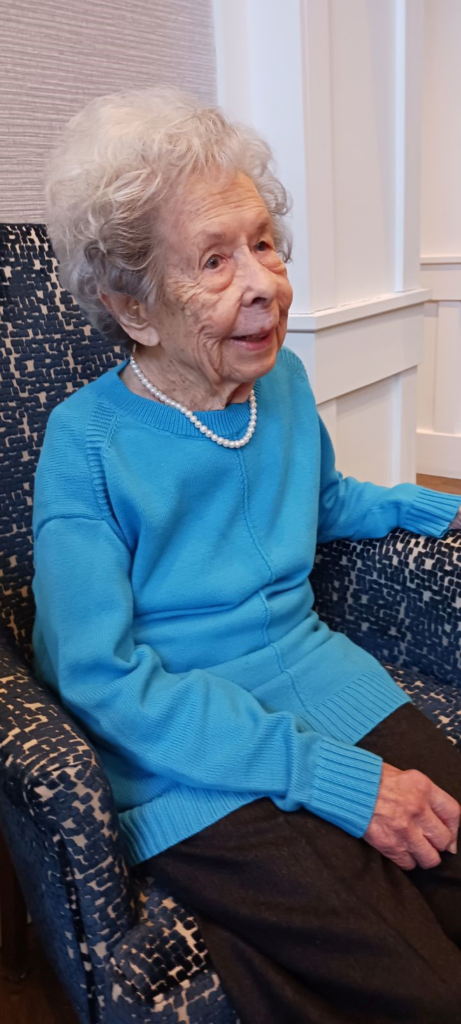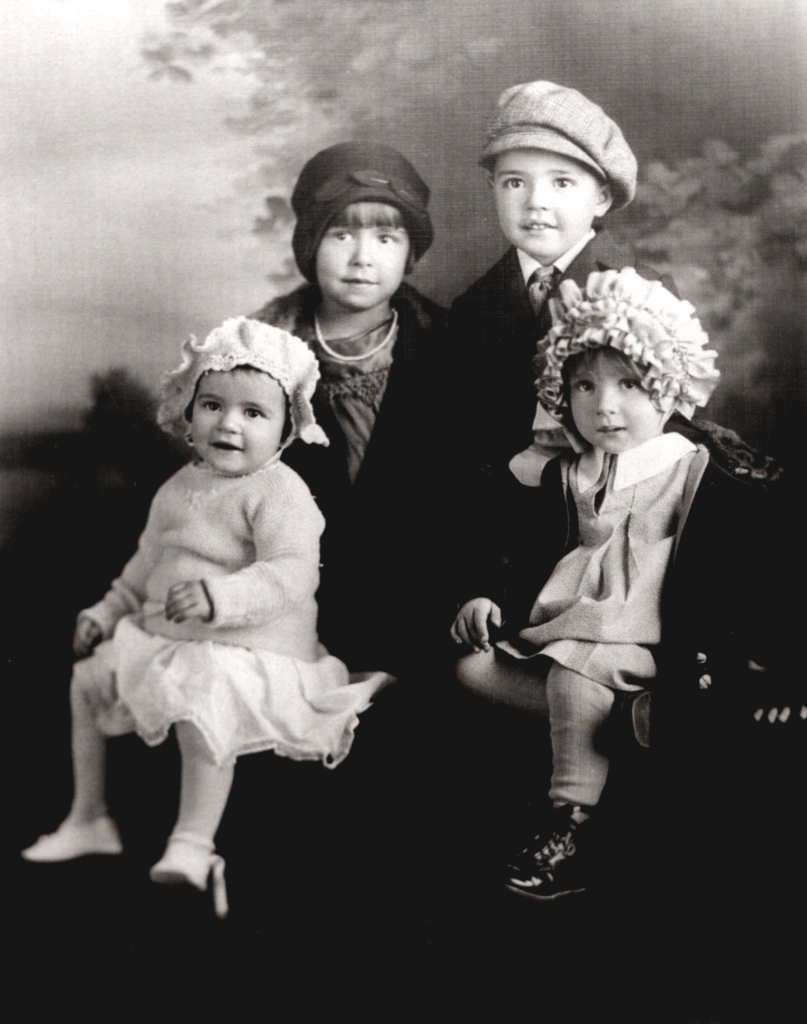During a recent Citizen Potawatomi Nation gathering in Olathe, Kansas, one special CPN elder stood out. Dr. Rosemary Schrepfer, 101, is among the oldest living CPN elders.
“Doc,” as she is lovingly known in her family, blazed a trail for women hoping to enter medicine. When she graduated from the University of Kansas’s medical school, she became the first woman to complete the obstetrician-gynecologist program.
Rosemary Schrepfer was born on Feb. 19, 1922, in Wichita, Kansas, the eldest of five children born to August and Cecelia “Susie” Schrepfer.

Rosemary lived in Wichita for two years until the family moved to Whitewater, Kansas, where they lived for several years until they moved to Potwin, Kansas. She attended schools in Potwin and Eldorado, Kansas, before graduating from high school in Eldorado.
Schrepfer recalled that at the age of 12, she drove the family’s Model T to Eldorado, Kansas, sitting high on pillows so she could see the road while her three siblings rode with her.
She has fond memories of her family, especially her father, August “Bob” Schrepfer. Bob Schrepfer also overcame numerous obstacles during his youth and as he worked to become established in his profession.
“It’s through my father that we trace being Potawatomi. While recognized, it was not a big part of our upbringing. Dad was orphaned as a child and he and his eight siblings were raised by two aunts,” Dr. Schrepfer said.
“He worked and received an engineering degree, and it was this specialized degree which allowed him to get a good job. He worked for Vickers Petroleum and literally built and then managed an oil refinery in Potwin, Kansas,” she added. “I think it was the pursuit of his degree that likely pushed him to play down his Native heritage as certainly there was a lot of stigma associated with this at the time.”
“We were lucky to have a father like we did, a man who paid careful attention to each of their children, all of whom went on to get a college education,” Schrepfer said.
In 1943, Rosemary began studying at the University of Kansas. She completed her undergraduate studies before entering KU’s medical school. Following seven years of studies, she began a one-year internship and then entered the ob-gyn program. Rosemary’s four-year residency took place at the KU hospital in Kansas City. Her third year of residency was at Duke University.

Other women had previously attempted to complete the rigorous ob-gyn program but were unsuccessful. Entering a male-dominated medical program, Dr. Schrepfer encountered numerous challenges.
In her words, the department chief was “old school” and was not supportive of women entering the field. No accommodations were made at the hospital for women. While male residents and doctors had beds to rest on, Dr. Schrepfer slept on carts or wherever space could be found.
This only helped strengthen her resolve to prove the naysayers wrong. Rosemary completed the residency and joined the KU staff to become the first female ob-gyn in the state of Kansas. Her primary role was as a teacher and she served patients as well, both in the hospital and in private practice.
“It was a killer, and I never got any rest,” Dr. Schrepfer described her time at KU med.
She remained there until 1983 when she decided to try something new. Dr. Schrepfer moved to Saudi Arabia and worked in a government hospital in the city of Tabuk in the northwest corner of the country near the Jordanian border.
Many of her patients were women who came in from the desert to deliver their babies. Dr. Schrepfer was originally supposed to teach, but many of the young, male doctors did not want a woman to tell them what to do. She instead focused on medical work throughout her stay.
Returning to Kansas City, Rosemary worked at the University of Missouri Kansas City hospital. There, she worked full-time for five years as a teacher and practicing physician. She then began running the outpatient maternity clinic part-time.
Dr. Schrepfer found tremendous enjoyment in this position as the department chief was very supportive and allowed staff to do what they felt was most needed and beneficial. When she retired in the mid-90s, she felt blessed to have worked in such a pleasant and supportive environment.
One of her most challenging deliveries was a woman who was in labor for three days. Labor began but the patient failed to dilate. Dr. Schrepfer was at her patient’s side the entire time, putting off the beginning of her vacation to see the delivery through to the end. Afterward, Rosemary called her friend June to pick her up, got in the back of the car and promptly fell asleep.
Dr. Schrepfer still remembers the only patient she lost. The patient came into the hospital with an infection. Dr. Schrepfer had to break the patient’s water to begin labor. The baby came, but two other patients unexpectedly came in and it was all-hands-on-deck. The patient suffering from the infection lasted for two to three days before finally succumbing to the infection.
When Dr. Schrepfer looks back on her career, she has no idea exactly how many babies she delivered but as she put it, “It was enough.”
Today, Rosemary describes her career as being a baby catcher, which is known in the ob-gyn field as a person who assists a woman in childbirth. Working as a baby catcher meant always being on call, and Dr. Schrepfer compares it to working in the emergency room as catastrophes were always waiting to strike. Unlike her male colleagues, she remained with her patients from the first call through the delivery, often sleeping on a cart in her patient’s room hoping labor would progress rapidly.
She received many offers to join private practice but felt the flexibility of working at the hospital would be more suitable for her lifestyle and allow for a better work-life balance.
Dr. Schrepfer offered her advice for good health and a long life.
“Wine — I am a firm adherent to a small glass of wine in the evening and I am sticking to it,” she said.
Dr. Schrepfer also recommends, “All things in moderation. Whatever you do have a positive approach. It doesn’t help to live in the past.”
For those who may encounter obstacles while pursuing a goal, she encourages them to be resilient.
“Once my residency was complete and I was a full-fledged doctor, my time was divided between teaching at the University of Kansas Medical School and actually delivering babies,” Dr. Schrepfer said. “After the trials I went through in med school as a resident where the head of my department did all he could to deter me this attitude towards women really motivated me to gut it out and complete the program.”
As a result of that, Dr. Schrepfer was determined to make a positive, lasting impact on her students while she was teaching medicine.
“In my role as a teacher of new residents, I preferred avoiding telling a resident what to do or not as it related to the future. My approach was to wait and see what they did in the execution of their duties. I was always very careful about correcting or changing the way they did their work,” Schrepfer said. “I always encouraged them when they did something on their own. My approach was to guide them, not punish them. I did my best to teach them well to avoid mistakes, but when mistakes were made this was the opening that allowed for guidance and more teaching.”
Not surprising for someone blessed with longevity, Dr. Schrepfer can recall many fulfilling and rewarding moments.
“While I did lots of travel and even worked overseas for a period of my life, clearly it was my work that provided me with the utmost satisfaction,” Schrepfer said. “I loved working with students, always having challenges before me. I never wanted to be the boss. It was nice to have teaching, research and practice as part of my experience. I liked keeping students happy and engaged.”
Schrepfer also found satisfaction in the different experiences life often provides.
“Always having something interesting to do made it all fun and worthwhile. Meeting all kinds of different people enhanced the experience and provided fulfillment,” Dr. Schrepfer recalled. “People came to me seeking help, and it was not always easy to find a solution to their problem. It was an interesting life.”
